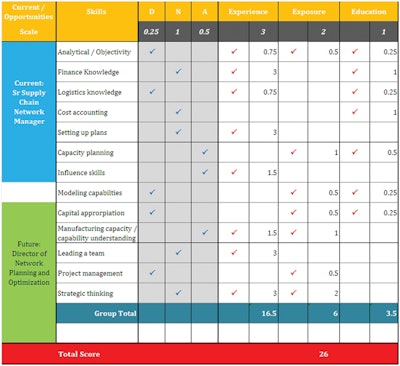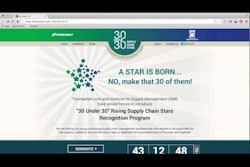
In part one of this series, we covered the five attributes of great CEOs, 10 questions you should ask about your organization, and 10 reasons to invest in internal leadership talent – plus 10 key areas to focus on if you want to become a great leader yourself. In this article we do a quick recap of 10 qualities to develop on the path to becoming a great leader and offer a typical transition roadmap, a skills attribute matrix and a 30-question self-assessment/audit to help you determine if you "have it in you" to be a great CEO, too.
10 Key Areas to Develop
If you or someone you coach/mentor is set on becoming a CEO with Supply Chain roots, following are key areas to focus on developing with that goal in mind:
1. Business acumen: Fundamental to everything else that follows.
2. Work ethic: If you want to make the climb, are you willing to do the time?
3. Networking Skills: Great leaders know how to network both internally and externally.
4. Earning the Stripes: Capability is interesting, but credibility comes from delivering results.
5. Permeability: Implies multi-directional data collection and synthesis across critical domains
6. People Skills: Do you the have ability to align & motivate others to get most out of your team?
7. Decision Making: Are you cool under fire versus running around like your head is on fire?
8. Lateral Development: Are you willing to take lateral assignments in other functions to improve business savvy?
9. Continuous Development: Do you demonstrate the ability to learn continuously?
10. Leaving Legacy: Do you have the ability to transform an organization while you are there?
The Journey from Performer to Leader
Illustration 1 depicts the evolution of an executive from an individual who is developing his own base of skills (technical, managerial, interpersonal, etc.) while earning a reputation as a performer to an individual who leads and sets the agenda for the rest of the organization to follow. Depicted in the concentric circle approach of evolution, each layer represents the increasing level of responsibility and maturity in key business skills necessary to successfully transform into a Supply Chain-Rooted CEO.
There are five stages of evolution: managing oneself, leading others, leading functions, leading businesses, leading the enterprise. In the first two stages the executive transitions from being inward-focused (gaining/seeking personal depth in expertise) to outward-focused (leading team-based performance). Through a progression of challenges and successes, the executive becomes increasingly outward-focused, moving from an individual performer to a leader, setting agendas of diverse and ever-increasing scope and scale, and motivating teams to achieve them.
This practice of visioning, communicating, gaining alignment, motivating and delivering results must be played out over and over throughout one's career and is the key to moving into a C-level role.
[Illustration 1]
Selecting the Roles for Progression
Deciding "how to decide" objectively whether to take one career opportunity or another is key to keeping on track toward your CEO goal. Emotions rarely work in your favor when considering job moves, and many a young manager is lured by a few more dollars that eventually leads them to be pigeonholed in a dead-end role.
Using the DNA Skills Matrix (Illustrations 2 & 3) developed by Natarajan & Hammond, odds of making the right move are improved greatly. Positions that serve to develop (D)existing skills in a similar environment are weighted lightly; positions that serve to add new (N) skills to your portfolio are given a heavier weighting; while those that require adapting (A) known skills to a new and challenging environment are given moderate weight.
The examples shown compare two different opportunities being presented to a Senior Manager of Network Planning. The more customary progression to Director of Network Planning actually provides lower career value than a move to Customer Service Logistics Manager. The scores developed through DNA method generate 38.25 points for customer service logistics manager versus 26 for the director of network planning role. This requires the candidate to think of his/her career in the long term – but that is what a CEO is expected to do!
Illustration 2. DNA as applied to transition from Sr. Manager to Director role in same discipline
[Illustration 2]
Illustration 3. DNA as applied to transition from Sr. Manager to a lateral role in another area
[Illustration 3]
Self-assessment/Audit
Following is a 30-question audit that can help you determine whether you have the relevant skills to make it to the top job. Questions are very specific and should help one to hone in on specific skills and to seek experiences that provide the opportunity to develop these skills.
Do You Have It in You
Business Acumen:
- Do you understand the nuts and bolts of how money was, is, and will be made in your industry and in your organization?
- Do you comprehend what are the fundamentals and assumptions underlying the theory of business in your company?
- Do you know, specifically, what your key customers value most about your company’s product or service? What their business model is? What are their moneymaking assumptions and any related business practice changes in the last 5 years?
Work Ethics:
- Do you have a systematic methodology to improve your productivity? Do you stretch your capabilities as a matter of course, always delivering more than what is expected?
- Are you willing to put in the extra time and go the extra mile as a way to standout from the crowd without losing the balance in your life?
- Do you consistently demonstrate a can do attitude, finding ways to get things done using resourcefulness and creativity versus cutting corners or lowering standards?
Networking Skills:
- Do you spend time building your social network? How many people & subject matter experts can you call for advocacy for specific problem – both internal and external?
- How effective is your internal advocacy group? Do Sr. leaders know you personally? Is this a result of your contributions to the organization?
- Do you make an effort to stay in touch with people who have helped you? Do give more than you seek?
Earning the Stripes:
- Will you like to the spend time to earn your credibility and finish what you’ve started, or are you likely get distracted and move on to new things?
- Do you desire to make contributions that are recognized internally and externally? Will you do so against all odds and in trying situation?
- Has your career progression been based on achievement or on politics and positioning?
Permeability:
- Do you have the energy and communication skills to influence, motivate and energize vertically (up & down) an organization to achieve exceptional results?
- Can you engage, align and build win-win holistic solutions horizontally in an organization and motivate people to willingly change behavior?
- Do you understand the theory of value chain efficiency? Are you willing to collaborate and help your external partners, customers and suppliers by making decisions for the holistic good?
People Skills:
- How effective are the people you develop? How many of them have gone on to make meaningful contributions elsewhere?
- Do you have a passion for developing leaders – soliciting, recruiting, coaching, mentoring, recognizing & rewarding and developing leadership skills?
- Do you have a systematic methodology to develop leaders? Do you focus on the specific needs of individuals? Do you spend time on the high potential performers?
Decision Making:
- Are you fact based and unemotional in your decision making? When all the data is not available, do you have fortitude to make timely, prudent and strategically relevant decisions?
- Do you project stability, composure and strength when things are not going as planned? Are you willing to be held accountability for failure? Will you readily change the course when presented with new facts?
- Do you keep track of your decision effectiveness?
Lateral Moves:
- Are you willing to make lateral moves as a way to develop the skills that you may be lacking?
- Do you have a career plan which calls for development in key areas? Do you have a plan that has timing of when, how and where?
- Do you understand what it takes to learn to make meaningful contribution in a lateral position?
Continuous Development:
- Do you spend your personal time (20% or more), monies & energy outside work to enhance your capabilities? Do you strive to make yourself proficient in areas outside of your core competency?
- Are you curious enough to spend time and involve yourself in projects outside your core competency to gain additional knowledge?
- Do you have a learning agenda for personal, professional and career growth? Do you proactively reach out to subject matter experts?
Leaving a Legacy:
- Do you leave an assignment with the organization and team in significantly better shape than the situation and team you inherited?
- Can you authentically take pride in your achievements?
- Can you consistently transform your work groups into high performing teams delivering results that they formerly would have thought unachievable?



















